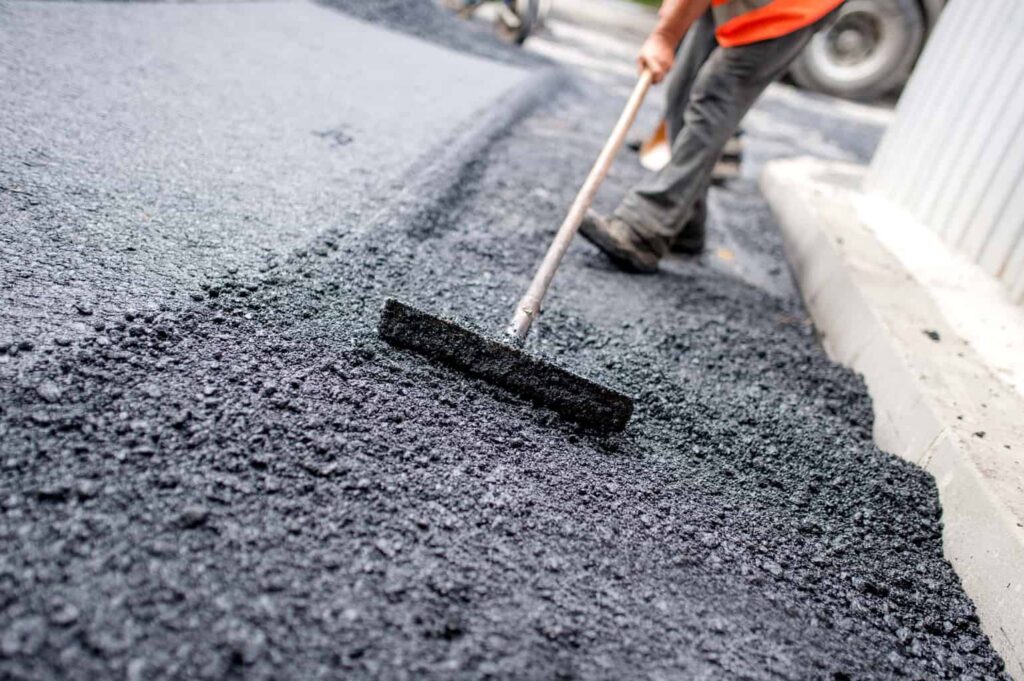Bitumen has a generally lower upfront cost. Simply put, this is because the amount of materials (aggregates in particular) required to create a bitumen road is less than concrete.
in the same way Is bitumen bad for the environment? Asphalt, also known as bitumen, is a major source of air pollution, especially in sunny and hot places. For one kind of harmful particulate pollution, asphalt emissions from roads and roofs may be a bigger problem than emissions from all petrol and diesel-powered vehicles.
How much does bitumen cost? Location
| State | Average cost per square metre |
|---|---|
| New South Wales | $45 |
| Queensland | $40 |
| South Australia | $30 |
| Northern Territory | $30 to $40 |
• Oct 31, 2021
How thick should bitumen be? Carparks depends on traffic, cars 25-40mm (30-35mm most popular), heavy loads and trucks etc generally 35-50mm (40mm is the most popular).
Can you put bitumen on concrete?
Bitumen is still sometimes used for damp proofing below-ground brickwork and concrete foundations. As it is contaminant-resistant and has no odour, the coating is also suitable for water tanks (not drinking water) and similar applications.
Beside this Is bitumen eco friendly?
Due to the manufacturing process, which removes the lower boiling molecules, emissions to the atmosphere do not occur under normal conditions of service. Bitumen emissions at ambient temperature are negligible.
Can asphalt contaminate a well? GAINESVILLE — Old asphalt scraped off roads does not bleed toxins into groundwater and is safe to use as construction fill, according to tests by University of Florida engineers.
Is bitumen hazardous? Bitumen is a product that has enjoyed a long history. Once it has been installed in roads, roofs or other applications, bitumen is an inert and hardwearing solid that represents no hazard to human health.
Where does bitumen come from?
bitumen, dense, highly viscous, petroleum-based hydrocarbon that is found in deposits such as oil sands and pitch lakes (natural bitumen) or is obtained as a residue of the distillation of crude oil (refined bitumen).
How long do bitumen driveways last? How long do asphalt driveways last? An asphalt driveway can last anywhere from 12 to 30 years before it needs repair work, comparable to concrete.
How much does a bitumen driveway cost?
The cost for asphalt driveways can range from $25.00 AUD per square meter to $55.00 per square meter. This depends on the thickness of asphalt required as well as how much preparation is needed for the area.
Can you put asphalt over old concrete? It is safe to pave asphalt over concrete. Concrete is a great base material because it is stable and allows for excellent compaction of the asphalt above. In fact, many miles of concrete roads are paved over with asphalt every year.
How long does a bitumen driveway last?
Asphalt driveways typically last up to 20 years, depending on the quality of the installation, the climate, the usage they get, and how well they are maintained. Like most everything else, the better care you take of your asphalt driveway, the longer it will remain in service.
Is asphalt better than concrete?
Concrete is more durable than asphalt. Because it is a less flexible material, it cracks in freezing temperatures, and many people turn to concrete patching products. … Though it is more durable overall, when damages do occur, concrete repair is harder and costlier than asphalt repair.
Does bitumen stop damp? Nowadays bitumen or bitumen derived paints and tapes are used in all manner of internal and external damp proofing and waterproofing applications very successfully.
How long does bitumen paint last? Bitumen paint is a durable material that can last a relatively long time. When applied to a felt roof bitumen will usually last 2 to 3 years before it begins to dry out. However, if applied to a more porous surface like masonry it will last longer.
Does asphalt stop damp?
The Use of Bitumen in Modern Damp Proofing and Damp Control. Bitumen (commonly referred to as asphalt) is typically thought of as a material for construction, usually with building roads. However what you may not realise is that this material can also be effective when it comes to damp proofing your home.
Can bitumen be reused? Most asphalt and bituminous material can be recycled, which is cheaper than reconstruction, can reduce demand for raw materials, decrease emissions output and divert useable materials from landfill.
What is the most environmentally friendly driveway?
The Top Eco-Friendly Materials to Repave Your Driveway
- Crushed Concrete. Concrete isn’t a naturally occurring material, but many homeowners rely on it for their driveways. …
- Natural Stone Pavers. …
- Sealcoating for Asphalt. …
- Porous Concrete. …
- Sandstone Bricks. …
- Perpetual Pavement. …
- Porous Asphalt. …
- Crushed Beach Shells.
What can replace bitumen? Lignin is one of the most abundant natural polymers (next to cellulose and hemi cellulose) present in plant material. The chemical structure known today does reflect the structure for bitumen and therefore it could be used as an alternative for bitumen in applications like roofing or asphalt.
Does asphalt leach into soil?
Significant concentrations of PAHs and hydrocarbons were recorded in soil, beneath an asphalt cover. … It is suggested that a significant amount of PAH can enter the environment through leaching from asphalt surfaces.
Is asphalt toxic to humans? * Breathing Asphalt fumes can irritate the nose, throat and lungs causing coughing, wheezing and/or shortness of breath. * Contact can irritate and cause severe burns of the skin and may cause dermatitis and acne-like lesions. * Exposure to Asphalt fumes can cause headache, dizziness, nausea and vomiting.
Is asphalt bad for the soil?
Soil that has been under asphalt, or concrete, is not inherently bad nor good. It does lack sufficient levels of organio matte but once that is corrected it should be as good as any other soil you have.
Do’t forget to share this post !
